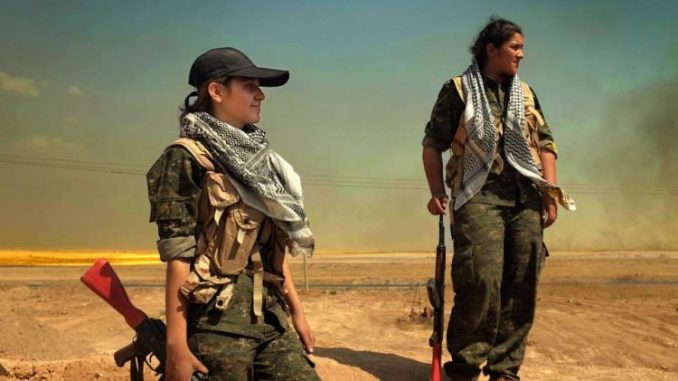
Kurdish endurance and success in the fight against ISIS terrorism in Iraq and Syria is putting the U.S., an old ally of the stateless Kurds in the Middle East, in a pickle.
Moscow’s influence in the region and the Kurdish desire for self governance could pivot the alliance from the U.S. toward Russia. It could also give Moscow a permanent lever in Syrian domestic politics and a lever against Recep Tayyip Erdogan
Sputnik reports:

BYPASS THE CENSORS
Sign up to get unfiltered news delivered straight to your inbox.
You can unsubscribe any time. By subscribing you agree to our Terms of Use
Latest Video
“The Russian government says it has sent troops to fight alongside Kurdish units in northwestern Syria and is providing weapons to Iraqi Kurds in a tactic that could upstage a long-standing US alliance with the stateless ethnic group and increase Moscow’s influence in the region,” according to The Wall Street Journal.
In Syria, the US relies on Kurdish fighters, an umbrella group, known as the People’s Defense Units, or YPG, as one of its most effective allies in the fight against Daesh (Islamic State), much to the irritation of Turkey, which sees the YPG as a threat for its close ties with the Kurdistan Workers’ Party, or PKK, which it alongside with the US and EU considers a terrorist organization.
A particular US concern is Russia’s demand for the Kurds to participate in the Syrian peace talks, “a move seen as a direct swipe at Ankara.”
“Before Russia’s intervention, the Kurds had no champion and no substantial claim to be part of the peace talks,” the newspaper says.
Russia’s weapons deliveries to Iraqi Kurds to step up its fight against Daesh and help in the eventual battle for Mosul also put Washington ill at ease.
Mark Katz, a professor at George Mason University who focuses on Russian foreign policy affairs, told the newspaper that Moscow’s move “might goad the Americans into stepping up arms supplies to prevent Russia from gaining the upper hand.”
Daily online magazine The Globalist provides its own reasons for the US’s unease.
Russia’s cooperation with the Kurds, it says, “gives Moscow three tools in one fell swoop — a permanent lever in Syrian domestic politics, another potential foothold in the Middle East, and a lever against Turkish President Recep Tayyip Erdogan.”
“Russia’s desire to undermine Erdogan after Turkey shot down a Russian military jet in November is well known, so the United States should work with Ankara to prevent Rojava (Kurdish Democratic Union Party’s (PYD) self-declared autonomous region along portions of Syria’s border with Turkey) from becoming the Kremlin’s security client,” it urges.
The situation is even more complicated, The Wall Street Journal says, as “Kurdish fighters’ well-publicized successes against Islamic State, and a perception in the region that Americans haven’t given full-bore support, have given Moscow new reason to boost ties with a group likely to play a strong role in a new Syria.”
“There is no doubt that the Kurdish factors will be one of the most important factors in the Middle East transformation in years to come,“ the newspaper concludes with the words of Fyodor Lukyanov, head of Russia’s Council on Foreign and Defense Policy, a Kremlin advisory body.


